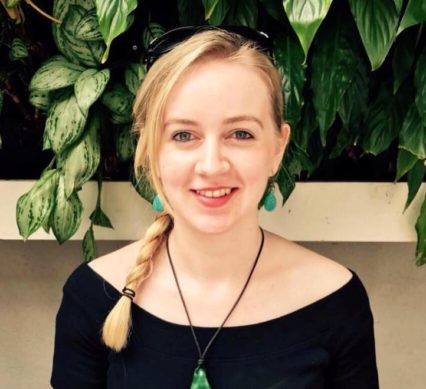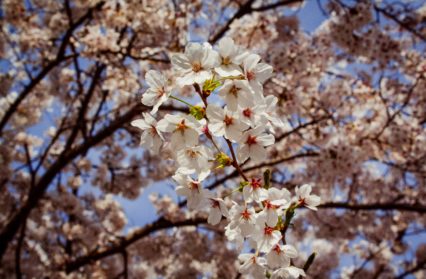Georgia Carys Williams presents Haiku for You, an online resource that promotes writing for improving mental well-being through short, achievable bursts of creativity.
So far, Haiku for You has been just as helpful for me.
It is a free, online haiku-hub, initially appearing as a twelve-week blog-series for absolutely anyone with or without a writing background. My main intention is that it makes you feel inspired and most importantly, enabled to write for your own well-being.

All you have to be is interested in taking part in the happiness practice. It is very flexible and as interactive as you want it to be. Every Monday, a new blog post will be revealed, which will informally talk about how haiku can exercise mindfulness within our daily lives, and provide new prompts and inspiration, including a few examples of haiku written by myself.
For the purpose of well-being, and contrary to the many writers who break away from this form for artistic rationale, I recommend the use of haiku’s traditional Japanese three-line and seventeen-syllable structure. My reason for this is that it is an opportunity to mimic the kind of pattern, routine and mindfulness that is conducive to living a mentally-healthy lifestyle. There will be the opportunity for people to either remain anonymous or share their own haiku in the comments section.
Why have I created this? For a long time, I had considered writing a blog, but I couldn’t find a sincere subject. All I knew was that I wanted it to be helpful for people. We all know we need to take care of ourselves, but sometimes, we are grateful for hints about how to actually do that, and how it could be achieved by a therapeutic craft.
A couple of years ago and several months after graduating with a PhD in creative writing, and the promise of an exciting world ahead of me, I experienced an involuntary break from reading or writing anything substantial. This was mainly due to my attempt to juggle a full-time job whilst teaching evening classes, (which I thoroughly enjoyed) alongside the third job of my actual writing. Whereas I had previously poured my heart and soul into an eighty thousand-word novel, I was suddenly unable to read more than the opening pages of a book before losing concentration, and equally unable to write more than a few pages. I wasn’t sure what had happened to the author who had written my short story collection or novel a few years before, but she suddenly seemed as fictional as her protagonists.
Instead of reading the long list of non thematic books I had told myself I would be free to enjoy reading after leaving university, I binged on online articles in a desperate attempt to find answers to whatever existential questions I typed into Google. Thankfully, another promise I had made to myself was to return to poetry and begin my poetry collection. Without any doubts, I decided this would focus on themes related to mental health and well-being.
 Starting small worked effectively for my well-being. I tried to be easy on myself, something I was not very familiar with. I began to pen single words, titles and lines in my notebook, until over the months, I witnessed them stretch into stanzas and mis-shaped poems, even if it was less efficient than I would have preferred. Gradually, my collection began to materialise.
Starting small worked effectively for my well-being. I tried to be easy on myself, something I was not very familiar with. I began to pen single words, titles and lines in my notebook, until over the months, I witnessed them stretch into stanzas and mis-shaped poems, even if it was less efficient than I would have preferred. Gradually, my collection began to materialise.
It was during similarly short bursts of reading that I was reminded of the simple beauty of a traditional form of Japanese poetry that many remember from school; haiku. Many haiku appealed to me in the same way that small escapes from sadness do; when you wake up to the consolation of sun glowing through the window, the soothe of its warmth on your back when you take a step outside, or the relief when you dunk yourself in a hot bath after an exhausting day. It made me think, “Haiku can actually make you feel good,” even if it creates the same, trivial comfort as a cup of tea and a biscuit.
The little moments matter a lot, and as I have discovered from my research into mental health, whilst maintaining your well-being, it is this appreciation that is key! Naturally, then, haiku and well-being formed a relationship that for me, had potential. I had found my helpful subject.
We are all aware that during the Covid-19 crisis, while many of us are participating in social distancing and well-being seems more relevant than ever, a vast amount of people are creating new projects. Here, from the understanding that we are all dealing with a range of fluctuating emotions, I would like to promote something that eases the pressure and is considered as an act of self-care that happens to be a small creation, rather than something of great deliberation. Here, writing Haiku is about calming down, removing external stressors, and taking each day as it comes.
I can reassure you that Haiku for You will not be a place of judgement, but purely, a place of mindful exercise – consider it a yoga class for writing. It is a safe space to achieve something small on a regular basis, to take personal action for your well-being and most of all, to remember to breathe.
Join in with Week 1 of the blog series now – Haiku for Home.
Dr Georgia Carys Williams is a Swansea-born fiction writer, poet and writer for well-being. She was a recipient of a Literature Wales bursary 2019, a Writer at Work at the Hay Festival 2019, and her short story collection, Second-hand Rain, was published by Parthian. Her debut novel was long-listed for the Mslexia Women’s Novel Competition 2017.
_______________________________________________________________________
Recommended for you:
Photography for Well-being | A Personal Journey
Lee Aspland presents Photography for Well-Being 1, a new book inspired by his own journey back to physical and mental health. Through experiencing nature, inspiring creativity and sharing ideas, Aspland hopes to use photography to improve the artistic skills and well-being of readers during the current COVID-19 outbreak.
_______________________________________________________________________



 Enjoyed this article? Support our writers directly by buying them a coffee and clicking this link.
Enjoyed this article? Support our writers directly by buying them a coffee and clicking this link.








